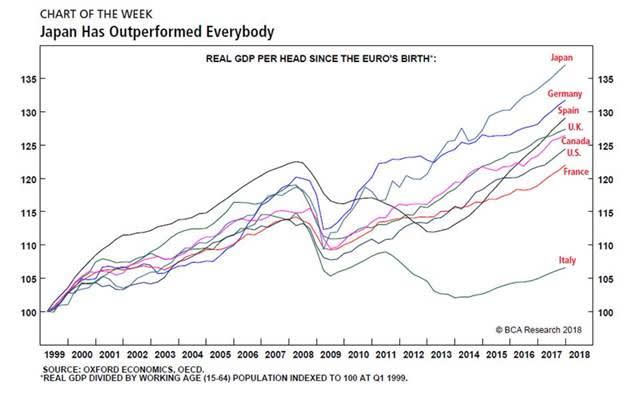Its not that bad, is it really that much worse than France. You have to note, Japan's cost of living (outside of Tokyo at least) is relatively lower than France is (and their GDP per capita is basically the same). 40k per year average is not bad at all.
GDP per capita is adjusted for living costs. And yes, Japan and France are close, but Japan has to work about 40% longer hours to get the same output. The long work hours of Japanese salarymen are unknown in France.
On the topic of the growth of GDP per capita in Japan, this may be relavent:
As you can see above, the growth rate of GDP per capita in Japan has outpaced all other developed nations in the past 18 years. If that rend continues, than Japan should start to catch up to the level of the US.
It's catchup from no growth in the 1990s. Japan's labor productivity as a percentage of the US rate peaked in 1990 (at 70%) and hasn't quite returned to that peak.
What I'd look for in a POD isn't just reducing the severity of the bubble, but also finding a way to get Japanese megacorps to shorten their work hours. High-income East Asia all does this - Japan is far from the worst. The question is whether it's possible for this to happen with a late POD without some serious cultural shock causing Japan to imitate Western norms regarding work hours. This shock is happening as we speak, since the American smartphone industry destroyed the Japanese feature phone industry, but it might be too late.
So if we're looking for a shock, we might want to find a way for Honda and Toyota to lose out to VW early. It's dicey - the auto industry in Japan is not just the largest exporter but also by far the largest sector that works outside the keiretsu system. On the other hand, the reduced profits of the Japanese auto industry don't really translate to fewer Japanese jobs, because, not exporting as many cars to the US as in OTL, Japan is never forced to pass export quotas by the Reagan administration.
So in the ATL, Honda and Toyota aren't providing many fewer Japanese jobs than in OTL in the mid-1980s. But they're a lot less profitable, which contributes to a slightly smaller financial bubble. To avoid being eaten alive by German and French automakers, they adopt German and French industrial norms: hiring engineers with graduate degrees, expecting them to stay in the industry their entire life but not necessarily at one company, paying and promoting people by work output and not by seniority or by face time. By the late 1990s and 2000s they are growing to the same size as in OTL, but by this point the US is near the peak of its free trade commitment and isn't passing export quotas, especially if the watershed year is 1999 and not 2002.
Within Japan, the auto boom is leading the traditional keiretsu to start adopting the business culture Honda and Toyota adopted from Europe. As a twist, the more tech-oriented companies are trying to incorporate Silicon Valley norms; most of these American ideas don't really fit in, unlike French and German ideas, so Japan doesn't invent Facebook and is basically a nonentity when it comes to software (except games), but it does manage to maintain its lead in consumer electronics. Sony and Panasonic are a lot bigger and Apple is a lot smaller than in OTL.
